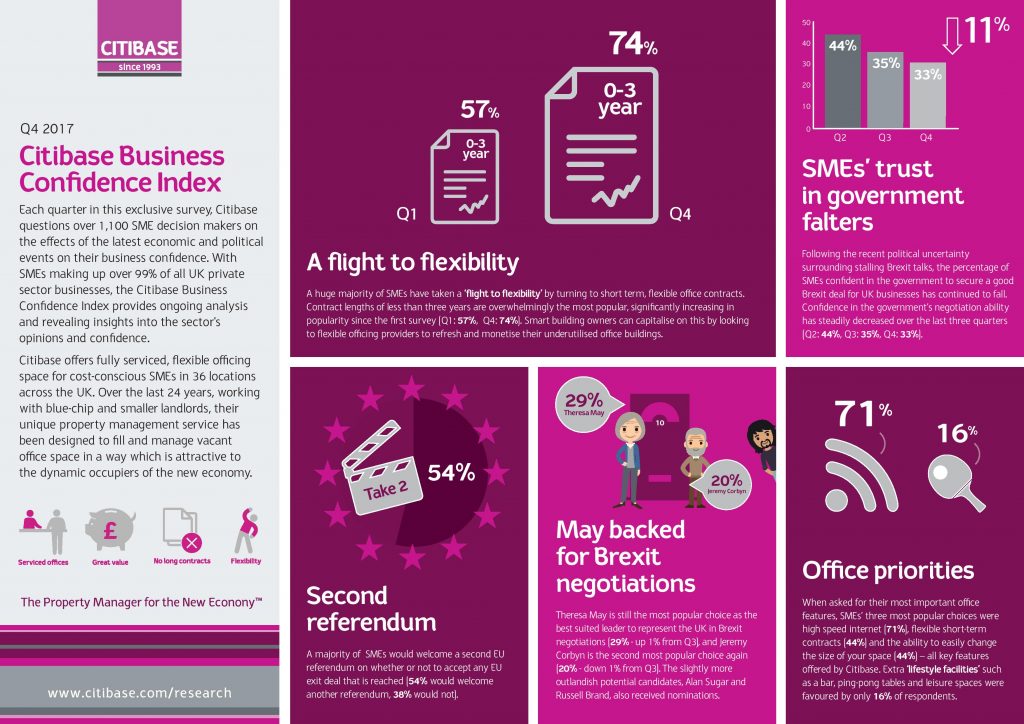 Back to all news
Back to all news

Over half of the UK’s SMEs call for second referendum as flight to flexibility escalates in Brexit Britain

54% of UK SMEs would welcome a second EU referendum on whether or not to accept the exit deal that is reached following Brexit negotiations, according to the latest Citibase Business Confidence Index, reflecting rising uncertainty caused by stalling Brexit talks and the suggestion that Britain could be prepared to walk away from the EU […]
54% of UK SMEs would welcome a second EU referendum on whether or not to accept the exit deal that is reached following Brexit negotiations, according to the latest Citibase Business Confidence Index, reflecting rising uncertainty caused by stalling Brexit talks and the suggestion that Britain could be prepared to walk away from the EU with no deal at all.
• SMEs take “flight to flexibility” with three quarters preferring short-term office contracts of under three years
• 54% of SMEs would welcome a second referendum on whether or not to accept any EU exit deal that is reached
• Just 33% of SMEs trust government to secure a good deal for UK businesses post-Brexit
• 56% of SMEs do not expect Theresa May’s premiership to continue for a full term – however she is still considered the best person to lead the UK’s Brexit negotiations
• 23% of SMEs see revenue drop in wake of EU referendum
Now in its fourth quarter, the survey of over 1,100 SMEs by flexible officing champion Citibase revealed that as a result of the ongoing uncertainty, cost-conscious SMEs are increasingly seeking short-term flexible office contracts, with almost three quarters (74%) stating that they want terms of less than three years. This has risen dramatically since the first quarter survey (Q1 = 57%) and is particularly prominent in the North East, where 90% of businesses preferred this lease length and Scotland (81%), reflecting Citibase CEO Steve Jude’s sentiment that “the battery has gone flat on the long office lease.”
Despite a dramatic Conservative party conference and internal leadership challenges, Theresa May is still the most popular choice as the best suited leader to represent the UK in Brexit negotiations (29%), with Jeremy Corbyn the second most popular choice again (20%). The slightly more outlandish potential candidates, Alan Sugar and Russell Brand, also received nominations. The much debated prospect of Jeremy Corbyn becoming prime minister was met with mixed response, with 34% of SMEs believing he would have a positive effect on their business, and 38% believing he would have a negative effect.
While she is still considered the best leader for Brexit, 56% of businesses do not expect Theresa May’s premiership to continue for a full term, a figure that is slightly lower in London at 48% and particularly pronounced in the North West at 65%. Equally damningly, confidence in the government’s ability to secure a good Brexit deal for UK businesses has continued to drop, with only 33% of UK SMEs now expressing their trust in the government’s negotiation abilities, down 2% from the previous quarter and 11% from Q2.
When asked for their three most important office features, SMEs prioritised high speed internet (71%), flexible short-term contracts (44%) and the ability to easily change the size of their space (44%). Despite being a hot topic at present, extra ‘lifestyle facilities’ such as a bar, ping pong tables and leisure spaces were favoured by only 16% of respondents, suggesting that SMEs want practical, affordable and flexible spaces with superfast connectivity that allow them to get on with running their business as opposed to costly distractions and extras.
The index has also revealed that 23% of SMEs cite Brexit as having a negative impact on revenue, a figure which has grown by 2% each quarter this year (Q1 = 17%, Q2 = 19%, Q3 = 21%). This impact was more pronounced in the capital, with 30% of London businesses reporting a drop in revenues. Meanwhile, 33% of SMEs are expecting a negative impact on their businesses when Brexit actually takes place, the same figure as the last quarter. This figure drops to 25% in the South West and climbs to 42% in London and 50% in the North East.
SMEs are a vital part of the UK economy, numbering up to 5.5 million in total nationwide*. The Citibase Business Confidence Index reflects the views of small businesses across a wide variety of sectors, including travel, finance, marketing, legal, research and IT, gauging opinions on the impact of political events on important factors such as revenue, morale, and expectations for the future.
Steve Jude, Citibase CEO, comments: “The heady combination of stalling Brexit talks, unrest within the Government and the suggestion that Britain may be prepared to walk away with no deal at all is causing unrest among SMEs – which are the lifeblood of our new economy. As a result, we are seeing a significant shift towards flexibility and agility, with nearly three quarters of entrepreneurs, start-ups and small businesses now shunning longer term, traditional office leases in favour of shorter terms in our latest exclusive quarterly index. This was particularly pronounced in the North East, where a massive 90% of SMEs expressed their desire for contracts of under three years. This is hard evidence that more and more businesses are waking up to the opportunities of taking low-risk contracts in fully serviced flexible officing hubs, allowing them to focus on what’s important – the success and growth of their businesses.
“These uncertain times also provide a golden opportunity for smart building owners to prosper, by looking to flexible officing companies like Citibase to transform their underutilised workspaces into cash generating assets. Whether it’s an empty floor or entire building, Citibase have nearly 25 years of experience in transforming office buildings. We manage the whole process from start to finish, creating vibrant spaces and filling them with entrepreneurs, start-ups and SMEs, and providing a reliable source of hassle-free revenue for the building owner. The government needs to ensure that they take a similar, agile approach to the future of the UK, allowing SMEs to thrive and paving the way for economic success.”
Key headlines
• Contract lengths of under three years have been the most popular over every quarter, massively increasing in popularity between Q1 and Q4 (Q1=57%, Q2=67%, Q3=64%, Q4=74%).
• Most SMEs would welcome a second EU referendum on whether or not to accept any exit deal that is reached (54% yes, 38% no).
• Theresa May is still the most popular choice as the best suited leader to lead the UK in Brexit negotiations (29%) and Jeremy Corbyn is the second most popular choice again (20%). Boris Johnson is now the third most popular, chosen by 11% of respondents (a 4% increase in share on Q3), and Vince Cable was the fourth most popular with 5%. May’s popularity has increased by 1% and Corbyn’s has decreased by 1% since Q3 (28% and 21% respectively).
• Despite having rumoured leadership ambitions, only six respondents favoured Kier Starmer, five chose Jacob Rees Mogg, five chose Nigel Farage and four chose Ruth Davidson. The slightly more outlandish potential candidates, Alan Sugar and Russell Brand, also received nominations.
• Confidence in the government’s ability to negotiate a good Brexit deal for UK businesses is at 33% and has steadily decreased over the last three quarters (Q2=44%, Q3=35%, Q4=33%).
• Nearly twice as many SMEs do not expect Theresa May’s premiership to continue for a full term as those that do (56% no, 31% yes).
• When asked for their three most important office features, the three most popular choices were high speed internet (71%), flexible short-term contracts (44%) and the ability to easily change the size of your space (44%).
• The percentage of SMEs who have experienced a negative effect on their revenue as a result of the Brexit vote has risen by 2% each quarter (Q1=17%, Q2=19%, Q3=21%, Q4=23)
Key regional statistics
• Contract lengths of less than three years have been most popular amongst London SMEs over every quarter, massive increasing between Q1 and Q4 (Q1=61%, Q2=64%, Q3=62%, Q4=74%). They were particularly popular in Scotland, Yorkshire and the North East (81%, 84% and 90% respectively).
• A greater proportion of London SMEs would like a second referendum on any Brexit deal that is reached than any other region (62%).
• More Scottish SMEs favoured Theresa May as the best leader to lead the UK in Brexit negotiations than any other region (37%). Nicola Sturgeon was the second most popular choice in Scotland (15%), followed by Jeremy Corbyn (13%). May’s popularity has increased by a significant 21% in Scotland since Q3 (16%).
• Contrary to the national average, London SMEs are more confident that the government will negotiate a good Brexit deal for UK SMEs (39%), than not confident (33%).
• There was an even split between Scottish SMEs who are confident in the government to get a good Brexit deal for UK businesses, and those that aren’t confident (both 35%). Their confidence in the government has decreased steadily by 4% over the last three quarters (Q2=43%, Q3=39%, Q4=35%).
• The South West and the North West had the highest proportion of SMEs who do not expect Theresa May’s premiership to last for a full term (65%).
• Following Labour’s gains in London at the last election, more London SMEs think Jeremy Corbyn would have a positive effect on their business’ prospects as prime minister (39%) than a negative effect (31%).
• The North East had the highest proportion of respondents who believe Jeremy Corbyn is the best person to lead the UK in Brexit negotiations of any region (37%), 17% more popular than Theresa May (20%). Corbyn was also the most popular choice in the North West (29%), where he was 2% more popular than May (27%).
• The amount of London SMEs who have seen a negative impact on their revenue as a result of the Brexit vote has increased throughout the index (Q1=18%, Q2=28%, Q3=28%, Q4=30%). Twice the percentage of London SMEs experienced a negative effect on their revenue as a result of the Brexit vote (30%) as Scottish SMEs (15%).
• More Yorkshire SMEs identified regaining control of laws as a priority in Brexit negotiations than any other region (20%). It was also the region that placed the least importance on controlling immigration as a priority (7%).
Our latest news and blogs
Need help finding your new office?
Get in touch:











